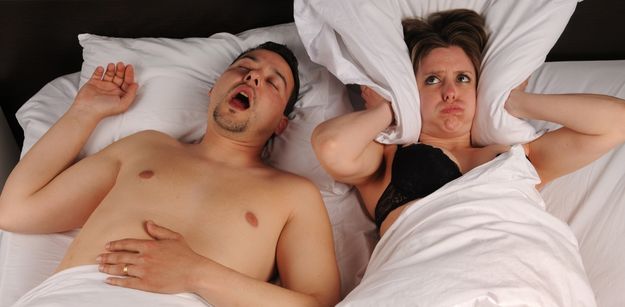Snoring is a common problem that can disrupt sleep and lead to several chronic health issues. Excessive snoring can also be a sign of disorders related to TMJ and sleep apnea, and it’s advisable to consult with your doctor about a diagnosis and treatment options. Understanding your snoring problem will help you find the right remedies to get a restful night’s sleep.
Snoring is a common problem and can be a frustrating problem for snorers. It can also make it harder for your bed partner to get a good night’s sleep. Several things can worsen snoring, some of which may be out of your control. However, knowing these habits while staying updated about TMJ and sleep apnea connection can help you deal with the situation.


Below discussed are the top five ways to fix snoring problems immediately:
1. Change Your Sleeping Position
If you’re a chronic snorer, changing your sleeping position may help stop your snoring gradually. Sleeping on your back makes the base of your tongue and soft palate collapse to the back wall of your throat, causing a vibrating sound when you breathe during sleep. Snoring is a common issue that can lead to sleep deprivation, a lack of restful sleep, and an increased risk of developing health problems, such as high blood pressure and heart disease.
Snoring can cause several other medical conditions, including obstructive sleep apnea, which causes your airways to narrow or become blocked during sleep. In these cases, it’s advisable to visit a center for sleep apnea in Nampa for the best-suited treatment. Sleeping on your side, instead of your back, can also help to reduce snoring by opening up your airways and keeping them open during the night.
2. Take a Hot Shower
A hot shower before bed can help your body regulate the ideal temperature for sleeping, improving your sleep. It also helps clear out the sinuses, which can lead to snoring due to congestion. It may also help open up nasal passages if you have a cold, allergies, or a deviated septum.
However, if you are allergic to chemicals or have an existing health condition, it is best to avoid hot showers until you feel better.
Snoring can also be a symptom of a more serious medical condition such as Obstructive Sleep Apnea, which is when breathing stops and starts during sleep. Taking a hot shower or steam can alleviate the pain and help you deal with the situation for the time being. However, medical guidance is always preferable if you have serious snoring problems. This is why it is important to seek professional help from your doctor and discuss how TMJ can cause sleep apnea.
3. Use a Facial Steam Bowl
Snoring is a common problem that can cause daytime fatigue, irritability, and relationship problems. It’s also a sign of sleep apnea, which can increase the risk of heart disease and stroke. A facial steam bowl is an easy and effective way to clear your airways before bed. It can also be used to help relieve nasal congestion caused by a cold or allergy. Taking full body steam or facial stream regularly can significantly reduce snoring problems.
If you use essential oils like eucalyptus or peppermint, they can help soothe your sinuses. You can also inhale them through a nebulizer to disintegrate mucus in your nasal passages and improve your breathing. Facial steam can also help remove blackheads from your nose, which can lead to premature skin aging. Regular facial steaming can also open up pores so that acne products can work more effectively. With the endless benefits of facial steam, it is highly recommended.
4. Change Your Diet
If you or someone you know is struggling with snoring, consider changing the eating habits. Consuming foods such as processed wheat, dairy products, and allergens can contribute to snoring by causing mucus buildup in your nasal passages. You should also avoid sedatives and alcohol as these relax your throat muscles. Lastly, smoking should be avoided as it can obstruct your nasal passages and lungs, leading to snoring.
Changing your diet can help reduce the amount of sugar and fat you eat, which are known to contribute to snoring. It is often a symptom of sleep apnea, which can be life-threatening and should be treated by a doctor. But most cases of snoring can be addressed with a combination of lifestyle changes and nonsurgical treatment options. It’s vital to know if you have TMJ disorder by visiting a well-experienced TMJ doctor and discussing how badly TMJ can cause sleep problems.
5. Exercise
Exercise can help tone your throat and nasal passages, which will help reduce snoring. Simple exercises, such as repeating each vowel in a certain way, can help you build up the strength and flexibility of your throat. Exercising your tongue and throat muscles is an effective and inexpensive way to reduce snoring. Just a few minutes of daily exercise can help to strengthen the mouth, throat, and jaw muscles that cause snoring and improve sleep quality.
Many people who snore report that exercise has helped them to stop snoring. However, it’s important to note that this treatment is not appropriate for everyone with snoring. In some cases, snoring may indicate a serious health problem, such as sleep apnea, which is a condition that requires medical attention. Talk to your family doctor or sleep expert about your snoring, TMJ disorders, and how TMJ can cause sleep apnea.
What Causes Snoring?
Snoring can happen for many reasons, but the primary cause is a blockage in the airways. This can be in the nose, mouth, or throat. The obstructed airflow allows the soft tissues in these areas to vibrate, making the sound of snoring. Nose problems such as a deviated septum or nasal polyps can also cause snoring. Talk to your doctor about possible nasal surgery to correct this problem.
Obesity and excess body weight can aggravate snoring by adding pressure to the airway. Losing weight can help you get a better night’s sleep. Changing your sleeping position, avoiding alcohol or other sedatives before bed, and using a snore-reducing pillow can also improve your sleep.
If you have lots of tonsils or adenoids, it can make it hard to breathe easily. They can also become enlarged or floppy, which can contribute to snoring. Snoring can be caused by several factors, including your body’s natural relaxation during sleep, certain medications, and alcohol consumption. Your doctor can examine you and do a sleep test to diagnose the underlying cause of your snoring.
Can TMJ Cause Sleep Problems?
The temporomandibular joint is part of your face where the lower jaw (mandible) meets the skull bone. It’s an important part of your face that allows you to chew, swallow and open your mouth. You can have pain in this area when the TMJ doesn’t function properly. Sleep is a major part of your health, and not getting enough sleep can make you tired, irritable, and less productive at work.
Changing your sleeping position can greatly reduce teeth grinding or clenching, which can cause TMJ and sleep apnea. Those who grind or clench their teeth are often encouraged to sleep on their back, keeping their head and neck aligned while reducing the pressure on their jaw. See your dentist or doctor for proper diagnosis, and treatment is also important.
Can TMJ Cause Sleep Apnea?
If you have a temporomandibular joint disorder (TMD) or sleep apnea, it’s obvious to wonder about this. These two conditions are often linked with those with TMD suffering from sleep apnea and vice versa. TMD causes jaw pain, limited movement, and locking of the jaw. It can also lead to headaches, earaches, and changes in hearing and teeth alignment.
If you’re dealing with these problems, it’s time to get treatment! If you’re a patient with TMJ and sleep apnea, a dentist can create a custom-fit oral appliance that will reposition your lower jaw at night to help you breathe easier while taking the strain off your TMJ. This simple solution will give you a better night’s sleep, improving your overall health and quality of life.
Conclusion
Snoring is a common problem but can signify something more serious. It’s vital to understand the TMJ and sleep apnea connection as they significantly impact each other. A poor night’s sleep can affect your personal and professional relationships with others. If you find it hard to fall asleep, it’s important to talk to your doctor about treatment options that can help you get the rest you need.



